Updated Sep. 27, 2023 6:16PM EDT / Published Sep. 27, 2023 3:29PM EDT
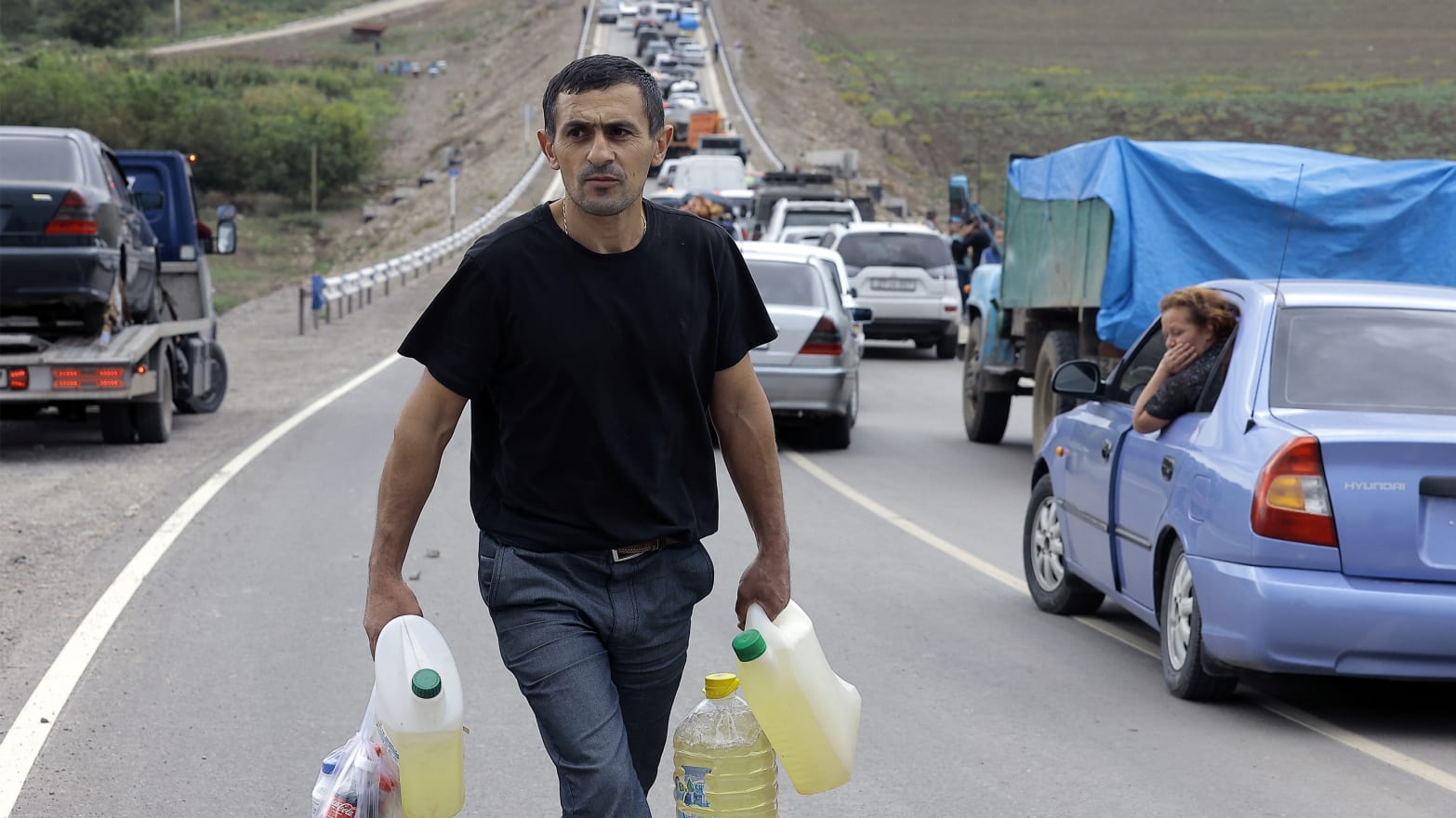
LACHIN CORRIDOR—Scores of refugees are fleeing the disputed region of Nagorno-Karabakh in the aftermath of a massive Azerbaijani offensive that forced the ethnic Armenian majority to give up control of the war-stricken enclave last week.
In a first since the mass exodus began on Sunday, The Daily Beast has gained exclusive access to the Lachin Corridor, the only road linking Nagorno-Karabakh—an internationally recognized region of Azerbaijan with an ethnically Armenian population—to Armenia.
Roughly 50,000 ethnic Armenians have fled the region within just days, traveling through the mountain road by foot, car, or in the back of dumpster trucks. Among the long stretch of road, some cars had broken down, leaving people stranded with no way to reach their safe haven.
On Monday, an explosion at an oil depot in Stepanakert cut the region off from fuel needed for the tens of thousands of people who have yet to escape. As a result, some have no other choice but to walk across the corridor, which involves walking through Azerbaijani checkpoints and trenches on either side of the roads, to put fuel in their cars.
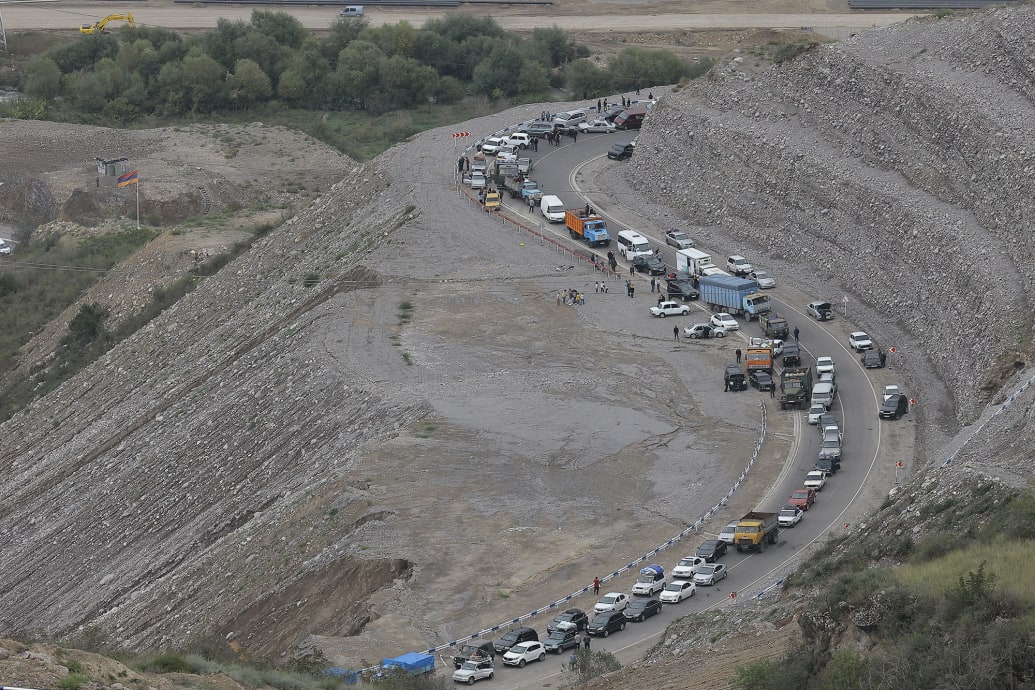
One of them was a man named Artur, who spoke to The Daily Beast as he walked back to his car with three jugs of oil from Kornizdor. He said he believed anywhere from 1,000 to 2,000 people were without fuel because of the explosion. As Artur walked back to his car, miles from the safety of the Armenian checkpoint set up to welcome refugees, he said there was only one reason he had been able to find oil and leave Nagorno-Karabakh in the first place: “Luck.”
‘Heart of stone’
The conflict surrounding Nagorno-Karabakh was years in the making, but in 2020, Azerbaijan launched a war that forced Armenia to give up the majority of its claim to the region. In its aftermath, Russian President Vladimir Putin—one of Armenia’s closest allies—acted as middleman for the two feuding countries, helping to forge a truce between the two sides while relying on Russian peacekeepers to keep the peace in the enclave.
The plan, however, quickly fell apart on Sept.19, when Azerbaijan launched an “anti-terror” operation that lasted just over 24 hours and resulted in the death of civilians and the destruction of homes and businesses. Armenian breakaway soldiers agreed to a ceasefire and Baku took control of the entire region. While the chaos of the invasion unfolded, the Armenians living in Nagorno-Karabakh were unable to flee, leading many to hide in underground bunkers or in hospital buildings as the conflict raged on.
The recent offensive only worsened the living conditions in Nagorno-Karabakh, where 120,000 residents had already been living under a humanitarian blockade imposed by Azerbaijan ten months ago. While the chaos of the invasion unfolded, the ethnic Armenians living in the enclave were unable to flee, leading many to hide in underground bunkers or in hospital buildings as the conflict raged on.
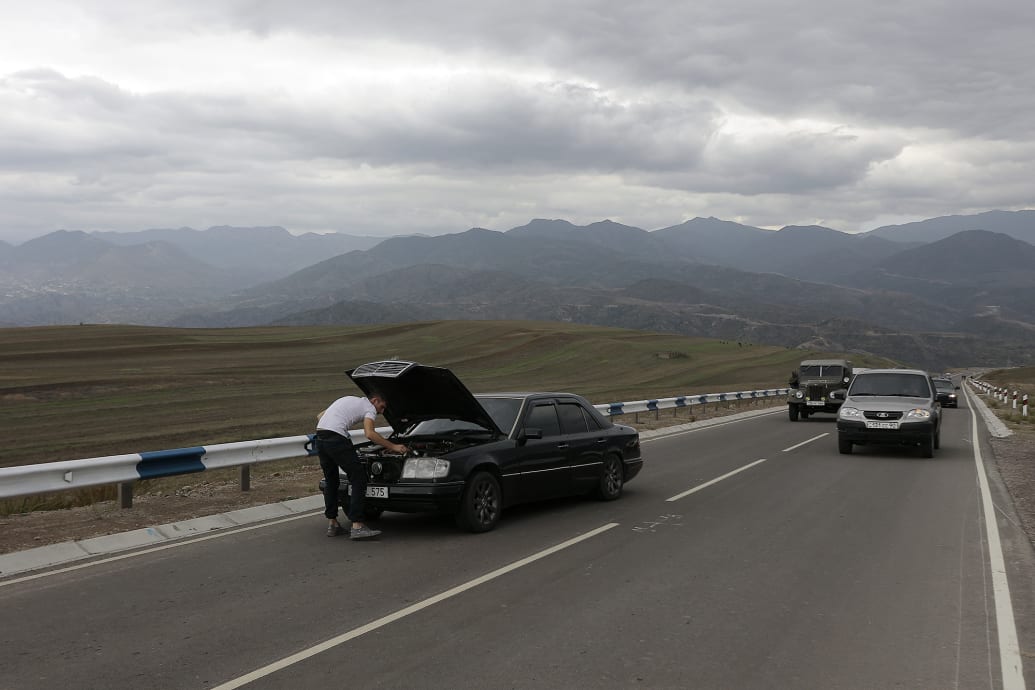
One of those who was forced to shelter underground as the violence raged was a 26-year-old man who asked to be referred to as “Davit.” He, along with his two sisters, their children, and his parents, lived underground for three days until they could pack into their cars and head for Korizor, the village nearest the Lachin Corridor.
Davit speaks to The Daily Beast from outside the Goris theater, a humanitarian aid checkpoint in Goris, one of the first towns refugees are brought to after crossing the border. The theater is a blur of activity as refugees scramble to collect aid, register in the Armenian government computer system, and connect with family members. Inside, children sit around two tables coloring pictures of animals and making paper mache art to bring with them. Nearby, a young mother nurses her infant, born during last week’s invasion. She has the tired eyes of a new mother and the sunken face of a woman who has just lived through an unimaginable hardship.
Journalists were kept from speaking with many of the people inside the theater, but outside, Davit recounts his experience living next to the dead for three days. “We were living in the bomb shelter in the hospital, and there were dead bodies here too. There were corpses of our people who died in a separate room next to us,” said Davit. The bodies of slain Armenians were piled into the room next to Davit because the hospital’s morgue had been overflowing with the dead.
“We don’t sleep. ”
Davit said that he is unsure how many bodies were lying in the room next to him, but that they were spread out on the floor of the room, left while others tried to hide from the war. The number of dead included his 22-year-old cousin, whose name Davit withheld. “I don’t know how he died, maybe from a bomb, maybe drones. They [Russian peacekeepers] told us he was dead, and I just went and looked. When you have to see a lot of dead, you become like you have a heart of stone,” said Davit.
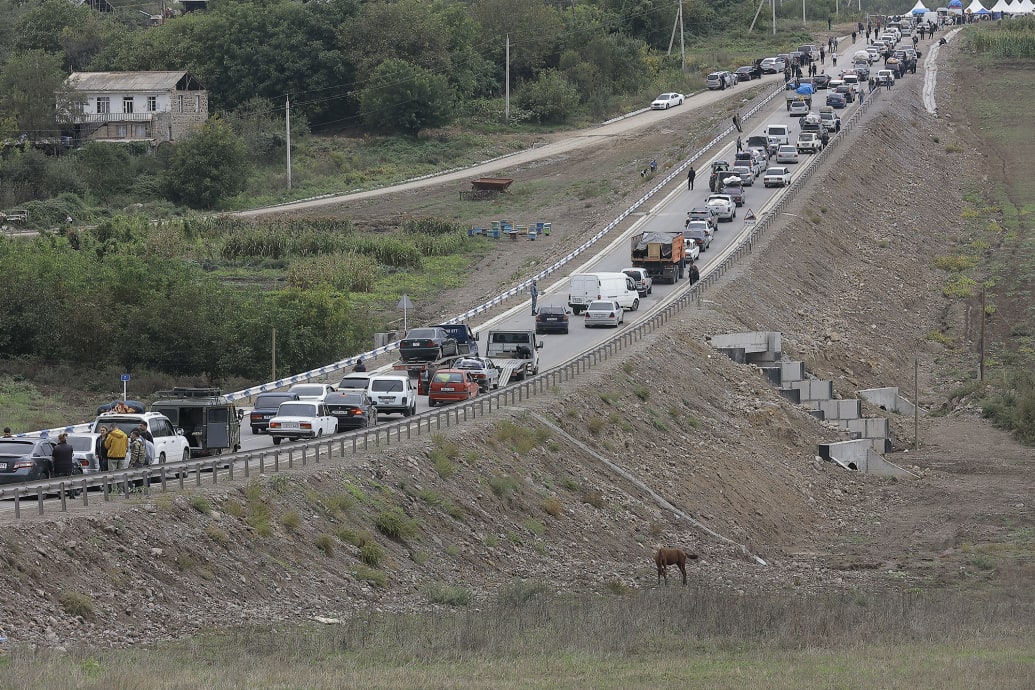
Dozens more Russian peacekeepers had been sent to Nagorno-Karabakh in recent months as part of the Kremlin’s effort to de-escalate tensions between Armenia and Azerbaijan. During the last war in the Caucasus region—which saw Nagorno-Karabakh turn into a battleground as Baku and Yerevan fought for control of the mountain region—Russia pledged to send troops and aid to Armenia. But this time around, few trusted Putin to protect the region as Russia fought its own war in Ukraine.
The refugees The Daily Beast spoke with said that the Russian peacekeepers meant to bring safety to the region did little to help. “There is no point,” said Davit when asked how he feels about Russian peacekeepers. He claimed that the swarms of Russians were underprepared to navigate the violent conflict that occurred last week. While many did not help Davit, he defended one, a man named “Andriy,” who he said was helpful and like a friend to him and his family. “Andriy is not guilty of anything. He helped us” to safety.
‘No soldiers to protect us anymore’
But others are far less sympathetic to the plight of the Russian peacekeepers. A few feet away from Davit, a woman in her 50s named Flora said the Russians “didn’t do anything to help us. Like sheep, they counted us. ‘How many of you are there?’ That is the only question we get. They don’t ask how many victims we have.”
Flora was searching for family members she had been separated from in her journey from Stepanakert to Gori. Though they too had escaped, Flora said that her neighbor had stayed behind because her teenage son had gone missing, and the woman refused to leave until she found out what happened to him.
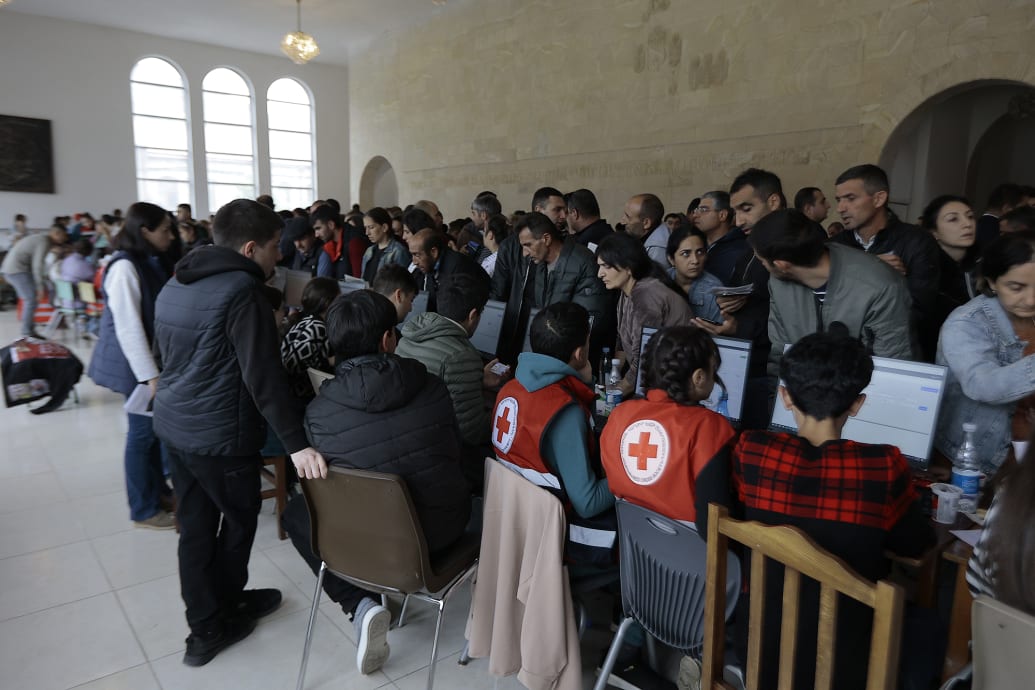
“She doesn’t have a husband, and she stayed [home] and said she will not go anywhere until she finds her son’s body. And they can’t find him. Neither alive nor dead, not wounded, not even pieces of him. They can’t find anything from him,” she said.
Flora voiced her anger for the lives of the people of Nagorno-Karabakh, asking why the West had not done more to help, and why Russia had not stopped the war. Referencing the humanitarian blockade, Flora said, “This is how the Russians helped us. For a year, we can’t find even vermicelli [noodles] to put water in and eat. I have seen four wars from 1992 up until today. They only give us empty promises.”
Another woman, Ira, 44, also lamented the lack of help from Russian peacekeepers while recounting her experience of fleeing a small village named Haterk. Ira was evacuated to Stepanakert, the capital of Karabakh, to live with relatives but said that she watched from her balcony as Azerbaijani soldiers walked through her backyard in their fight for Nagorno-Karabakh. “We heard planes passing and dropping bombs and houses. Our roof was damaged, and the chandelier fell, too. The sounds of the bomb broke our windows,” said Ira.
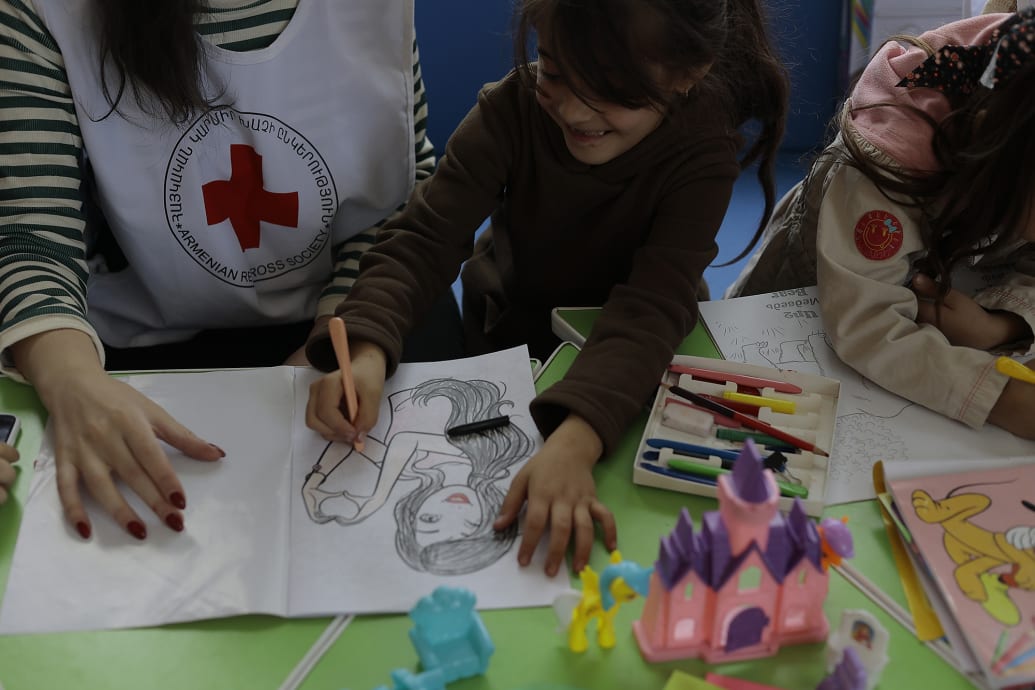
But Ira was one of the fortunate ones to escape safely. She claimed that Azerbaijani soldiers had a bounty on the head of one 18-year-old girl who managed to escape after her family was killed, but her information comes from word of mouth rather than personal experiences, shared through Telegram channels and Whatsapp conversations while running from her home and life.
While refugees trickle into Goris and various cities throughout Armenia, those making the journey are desperately trying to reach safety. Back in the Lachin Corridor, The Daily Beast witnessed entire families packed into construction trucks being driven to Kornitzer, the village located just on the other side of the corridor. The occasional Russian peacekeeper could be spotted with their flag on full display as they brought refugees to Armenia.
A man named Artam was sitting on the side of the road near three cars that were carrying his immediate and extended family. All three were without fuel. Not far from him, a family with four children was walking down the road, appearing exhausted as they inched toward Armenia.
But those on the corridor are just a few of the hundreds who are sitting at the entrance of Nagorno-Karabakh at the Azerbaijan checkpoint, where they are having their documents checked by the country that was forcing them out of their home.
A 44-year-old woman named Ira from Chartar, Martuni, is still trapped in Stepanakert. In a phone call with The Daily Beast, Ira said that she, her two children, and her husband are “waiting to get out with the Russian peacekeepers because the road is blocked by Azerbaijan. We did not get any food or water from them (Russian peacekeepers). We are very frightened. We stayed awake all night. We don’t sleep. How can we when there are Azerbaijanis so close to us?”
“The thing that frightens me the most is that our army has been disarmed and left without weapons,” she said. “That’s what I am most afraid of. There are no soldiers to protect us anymore.”
